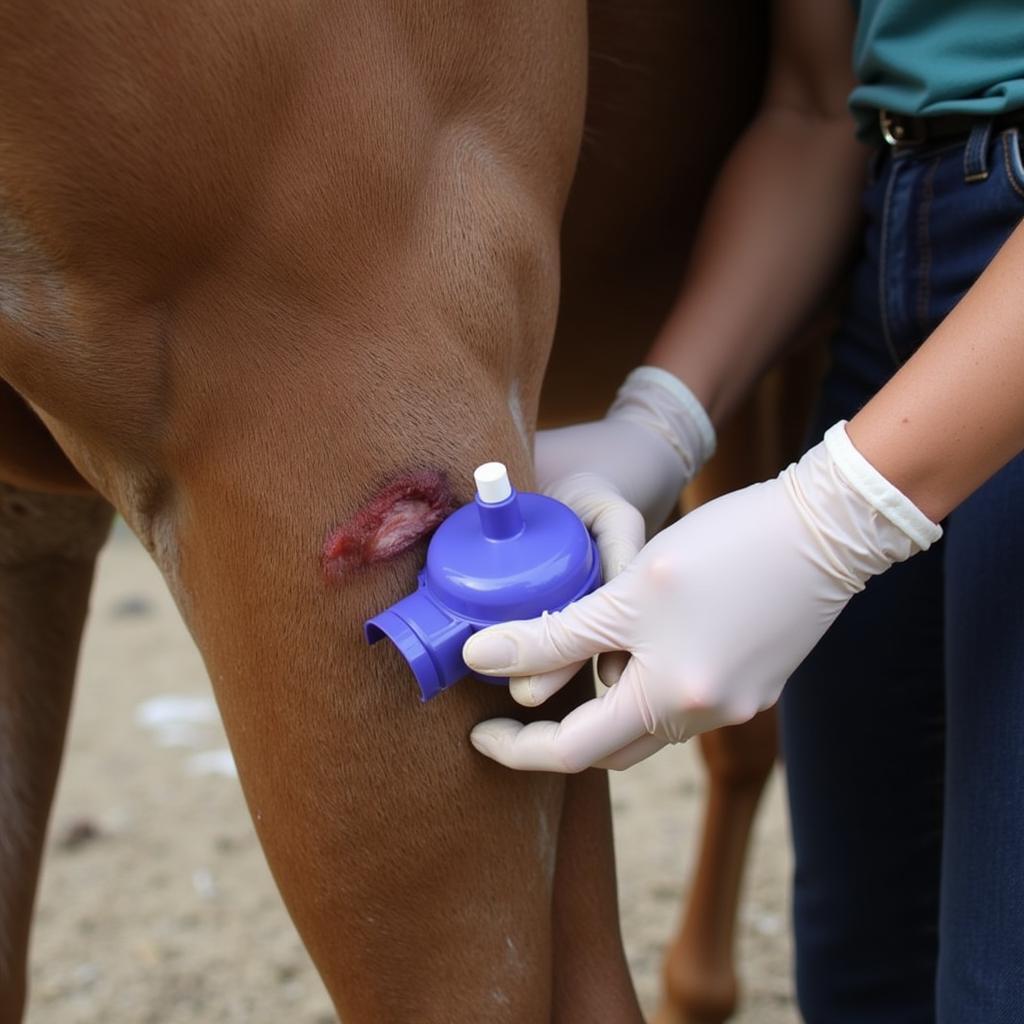Horse Wound Ointment is an essential item in any equine first-aid kit. Knowing which ointment to use, and when, can make a significant difference in the healing process and prevent complications. This guide will help you understand the various types of horse wound ointments available, their uses, and how to choose the best one for your horse’s specific needs.
Understanding Different Types of Horse Wound Ointments
There’s a wide range of horse wound ointments on the market, each designed for specific purposes. Understanding these differences is key to effective wound management. Broadly, they can be categorized as antiseptics, antibiotics, healing stimulants, and barrier creams. Antiseptic ointments like iodine-based solutions are primarily used for initial cleaning and disinfection. Antibiotic ointments, often containing ingredients like bacitracin or neomycin, target bacterial infections. Healing stimulants encourage tissue regeneration, while barrier creams protect the wound from external irritants and promote a moist healing environment.
 Cleaning a Horse Leg Wound
Cleaning a Horse Leg Wound
Selecting the Right Horse Wound Ointment: A Step-by-Step Guide
Choosing the correct horse wound ointment involves several factors, including the type of wound, its severity, and the presence of infection.
- Assess the Wound: Identify the type of wound (puncture, laceration, abrasion, etc.) and its depth.
- Cleanse the Wound: Thoroughly clean the wound with a mild antiseptic solution before applying any ointment.
- Consider Infection: If signs of infection are present, such as pus, swelling, heat, or pain, consult a veterinarian for appropriate antibiotic treatment. ointment for horse wounds can offer valuable information regarding this topic.
- Choose the Right Ointment: Select an ointment based on the wound’s characteristics. For minor abrasions, a simple barrier cream may suffice. Deeper wounds or those at risk of infection may benefit from antibiotic or healing stimulant ointments. horse wound care products provide a broader perspective on wound management.
- Follow Instructions: Carefully follow the manufacturer’s instructions regarding application frequency and duration.
Commonly Asked Questions about Horse Wound Ointments: What should I use?
What is the best horse wound ointment for proud flesh? Some ointments contain corticosteroids to manage proud flesh. Always consult your veterinarian for advice.
How often should I apply horse wound ointment? Application frequency varies depending on the specific product and the nature of the wound.
Can I use human wound ointment on my horse? It’s generally recommended to use ointments specifically formulated for horses, as their skin has different requirements. You can explore ichthammol for horses to learn more about specific products.
Expert Insights
Dr. Emily Carter, DVM, emphasizes the importance of proper wound assessment: “The first step in choosing a horse wound ointment is to accurately determine the wound’s type and severity. This helps guide the selection of the most effective treatment.”
John Miller, a seasoned equine care specialist, adds: “Don’t underestimate the value of a well-stocked horse first aid kit checklist. Having the right supplies on hand can make a crucial difference in those first critical moments after an injury.”
Conclusion
Selecting the appropriate horse wound ointment plays a vital role in ensuring effective healing and minimizing the risk of complications. By understanding the different types of ointments available and following a systematic approach to wound assessment and treatment, you can help your horse recover quickly and comfortably. Remember to consult your veterinarian for any serious wounds or signs of infection. Knowing more about potential infections like staph infection in horses can be beneficial.
FAQ
- What are the signs of a wound infection in a horse?
- What is the best way to clean a horse wound?
- How can I prevent proud flesh in horse wounds?
- When should I call a veterinarian for a horse wound?
- Can I use honey as a horse wound ointment?
- What are the different types of wound dressings for horses?
- How can I tell if a horse wound is healing properly?
If you need further assistance, please contact us. Phone: 0772127271, Email: [email protected] Address: QGM2+WX2, Vị Trung, Vị Thuỷ, Hậu Giang, Việt Nam. We have a 24/7 customer service team.